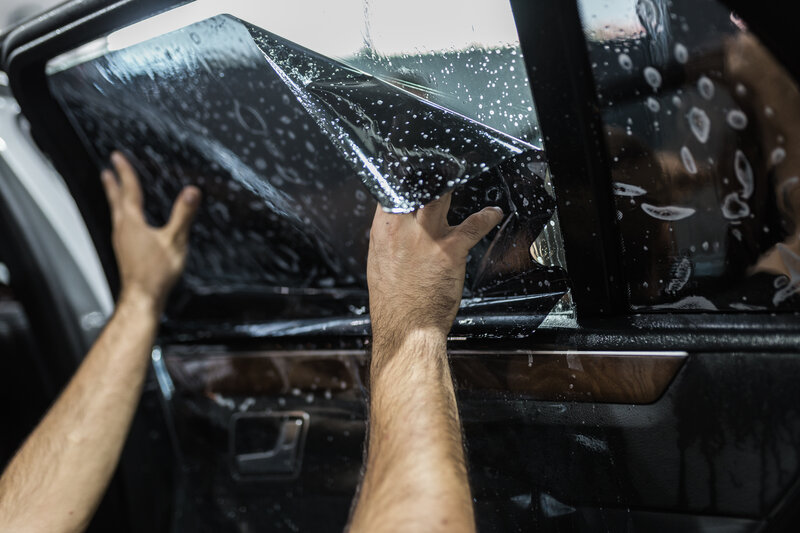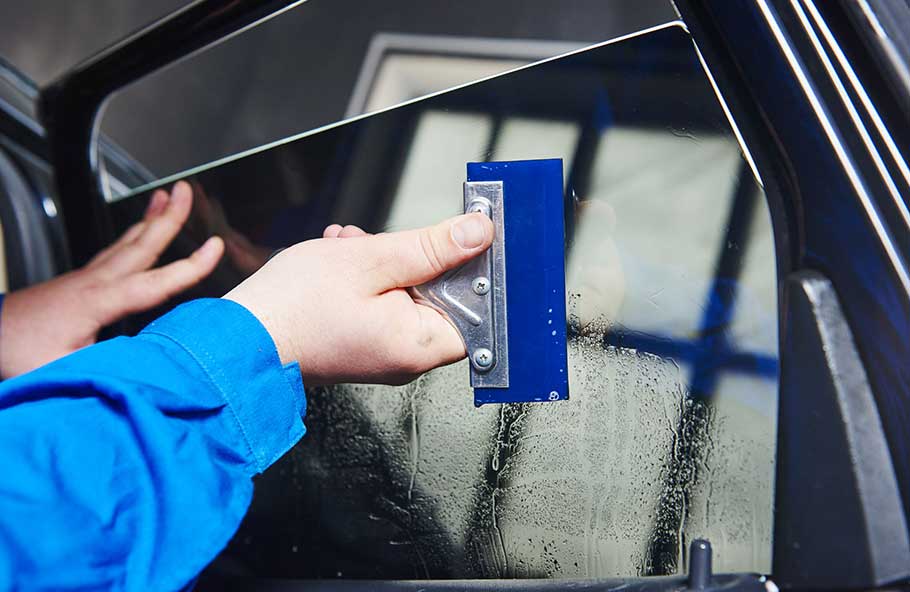Every little thing You Need to Find Out About Automobile Home Window Tinting for Your Car
Automobile window tinting is a practical enhancement for lots of automobile proprietors. It supplies benefits such as raised convenience and power efficiency. Numerous color films deal with various requirements and preferences. However, understanding lawful laws and choosing the ideal tint percentage is important. The setup process and appropriate maintenance likewise play substantial roles in guaranteeing the longevity of the tint. What other variables should one think about before deciding on home window tinting?
Advantages of Car Window Tinting
Although some automobile owners might ignore it, auto window tinting deals countless benefits that boost both the driving experience and the vehicle's durability. Among the primary advantages is the reduction of warmth buildup inside the car, enabling an extra comfy trip, particularly during warm climate. This can lead to decreased dependence on air conditioning, enhancing fuel efficiency.Additionally, window tinting gives protection versus unsafe UV rays, which can create skin damage and discolor interior products in time. By obstructing these rays, the tint assists preserve the lorry's inside and maintain its resale value.Moreover, colored home windows can improve privacy and safety and security, as they make it harder for outsiders to see inside the vehicle. This included layer of protection can prevent prospective theft. On the whole, car window tinting works as a practical investment that adds to the lorry and both comfort's general health.
Kinds of Home Window Tint Films
When taking into consideration automobile window tinting, vehicle owners experience a variety of window tint movies, each created to meet certain needs and choices. The first classification is dyed home window movie, which offers a fundamental level of personal privacy and UV defense while being affordable. Next, metalized movies integrate tiny metallic particles, reflecting heat and enhancing sturdiness, although they might disrupt digital signals.Ceramic films are one more alternative, recognized for their remarkable warmth being rejected and clarity, offering high efficiency without signal interference. Crossbreed films integrate features of dyed and metalized films, striking a balance in between cost and capability. Each kind of home window color film presents unique advantages, allowing lorry proprietors to select based on their certain demands, such as warm budget plan, appearance, and control factors to consider. Recognizing these options is necessary for making an educated decision relating to car home window tinting.
Comprehending Legal Laws
When considering car window tinting, it is vital to comprehend the lawful regulations that regulate color darkness limits and windshield color needs. These policies can vary considerably from one state to another, affecting what is acceptable for vehicle owners. Familiarizing oneself with these laws warranties conformity and assists prevent potential penalties or charges.
Tint Darkness Limitations
Just how can automobile owners guarantee they remain compliant with neighborhood legislations pertaining to window tinting? Understanding tint darkness restrictions is necessary. Each state has particular laws that dictate the acceptable levels of darkness for home window colors, which are measured by Visible Light Transmission (VLT) percentages. Commonly, front-side windows have to allow a greater percentage of light contrasted to back windows. As an example, some states may allow only 30% VLT for front home windows, while the back home windows may be permitted to have especially darker tints. To guarantee conformity, lorry owners should get in touch with state standards or neighborhood police for precise info. Additionally, certified tinting specialists can give insights regarding lawful limitations, making certain that car proprietors make educated choices.
Windshield Color Regulations

State-Specific Regulations
Guiding through the landscape of state-specific legislations relating to vehicle home window tinting needs careful attention to detail, as guidelines can vary considerably from one state to an additional. Each state has its very own set of regulations regulating permitted tint portions, kinds of products, and placement on automobile home windows. Some states allow darker colors on back home windows while forbiding them on front home windows, while others have more stringent total limits (automotive window tinting clinton township). Furthermore, certain states mandate making use of details products or call for qualification from installers. Failing to adhere to these laws can result in fines or the requirement to get rid of non-compliant tint. Subsequently, automobile owners need to consult their state's Department of Motor Automobiles or pertinent authority read more to assure adherence to neighborhood regulations
Picking the Right Color Portion
When selecting the appropriate tint portion for an automobile's home windows, one should consider numerous aspects that influence both looks and functionality. Tint percents commonly range from 5% to 70%, with lower percentages supplying darker shades and higher percentages permitting much more light in. A darker color can boost personal privacy and minimize glow, while a lighter tint can keep visibility and follow lawful restrictions.Furthermore, personal choice plays a considerable duty in this decision. Some people might like the sleek appearance of darker colors, while others could favor a more open, ventilated feel. Additionally, the lorry's objective must be taken into account; for example, those utilizing their automobiles for business purposes could select lighter colors to maintain a specialist look.Ultimately, the ideal tint percent balances individual style, comfort, and adherence to local regulations, making certain an enjoyable tinting experience.
The Installment Process
An effective installation of home window tint calls for mindful focus to information and the right devices. The process generally begins with thorough cleaning of the windows to get rid of dust, debris, and dirt, guaranteeing proper attachment of the movie. When the surfaces are prepared, the installer steps and cuts the tint movie to fit each window accurately.Next, the movie is positioned on the glass, typically utilizing a service to promote simple adjustment and stop air bubbles. Warmth is occasionally used to the movie to adhere it to the home window's contours, improving its look and longevity. After verifying a smooth fit, the installer meticulously trims any type of excess movie along the edges.Finally, the installer checks for blemishes and validates all sides are safe. This meticulous strategy is vital not only for aesthetic appeals but likewise for attaining the desired performance benefits of window tinting, such as UV protection and warmth reduction.
Maintenance and Look After Tinted Windows
Appropriate upkeep and treatment are essential for preserving the integrity of tinted home windows. Efficient cleansing methods, the evasion of damaging chemicals, and normal examinations for damages play essential roles in making certain durability. By complying with these standards, car proprietors can keep the useful and visual benefits of their window tint.
Cleaning Methods for Color
Keeping the clearness and longevity of colored windows needs particular cleansing strategies tailored to the film's delicate surface. It is important to make use of a soft microfiber towel to avoid scratching the color while cleansing. A mild service of water and a few drops of light dish soap can efficiently remove dirt and gunk. It is suggested to use the cleaning service to the fabric, instead than directly onto the colored surface area, to avoid wetness from seeping right into the edges of the film. Mild, round motions must be used to clean the windows extensively. Routine cleansing aids keep exposure and avoids buildup, guaranteeing that the tint stays in prime problem with time. Adhering to these methods will certainly prolong the life of tinted windows.
Staying Clear Of Damaging Chemicals
Although lots of house cleaning items are effective on numerous surface areas, they can posture significant risks to tinted windows. Chemicals such as ammonia, bleach, and particular solvents can degrade the tint film, resulting in staining and peeling. People should choose pH-balanced cleansers particularly created for colored home windows. In addition, making use of soft microfiber cloths will certainly help avoid scrapes and maintain the tint's honesty. Normal maintenance is crucial; as a result, staying clear of harsh scrubbing or rough products is crucial. It is a good idea to read item tags very carefully to confirm compatibility with home window colors. By choosing the right cleaning services and devices, automobile owners can protect the appearance and capability of their tinted windows, guaranteeing a much longer lifespan and height efficiency.
Examining for Damage
Routine assessments of tinted home windows are essential for determining any type of indicators of damages that might endanger their effectiveness and look. Owners should seek gurgling, peeling, or discoloration, as these problems can suggest bad installment or direct exposure to damaging aspects. It is recommended to inspect the edges of the film where peeling might start and check for any kind of scrapes that can influence visibility. Additionally, ultraviolet (UV) rays can create the tint to deteriorate with time, so monitoring its efficiency in blocking UV light is vital. If any kind of damages is detected, timely activity needs to be taken, which may consist of professional repair or substitute. Preserving tinted home windows not only boosts appearances yet additionally guarantees proceeded defense for both travelers and the car interior.
Common Misconceptions About Window Tinting
What misunderstandings border window tinting for cars? Many individuals think that why not check here all home window tints this are unlawful, but policies vary by state, enabling specific degrees of tinting. One more usual myth is that darker tints block even more heat; however, the effectiveness of window movies relies on their technology instead than darkness. Some individuals likewise assume that home window tinting is exclusively for appearances, neglecting its benefits, such as UV defense and glow reduction. Furthermore, lots of presume that window tinting will harm their car's glass, but skillfully used colors can in fact enhance glass toughness. There is an idea that home window tints obstruct presence, yet top quality movies are made to maintain clear sightlines while offering privacy. Comprehending these myths aids customers make informed choices pertaining to home window tinting, ensuring they delight in the complete range of benefits it supplies.
Often Asked Questions
The Length Of Time Does Home Window Tinting Typically Last?
The durability of window tinting differs based upon elements such as installation top quality, movie kind, and environmental conditions. Typically, high-grade tint can last anywhere from 5 to 10 years before calling for substitute or reapplication.
Can I Remove Home Window Tint Myself?
Getting rid of home window tint oneself is feasible, though it might be challenging. People ought to utilize a warmth source and adhesive eliminator to relieve the procedure, but care is advised to prevent harming the car's glass or inside.
What Devices Are Required for Do It Yourself Window Tinting?

Will Window Tinting Damages My Automobile's Glass?
Window tinting, when applied properly, typically does not harm an automobile's glass. Nevertheless, incorrect installment or low-grade movies might lead to peeling, gurgling, or damaging, possibly jeopardizing the integrity of the glass over time.
Can Tinted Windows Affect My Automobile's Resale Worth?
The effect of colored home windows on a lorry's resale value can differ. While some customers appreciate the added privacy and UV security, others might view it as a possible issue, possibly affecting resale positively or adversely. When thinking about auto home window tinting, automobile owners encounter a selection of home window tint films, each created to fulfill specific needs and preferences. When considering car window tinting, it is crucial to understand the legal policies that regulate color darkness limits and windscreen color needs. Generally, front-side home windows should enable a higher percentage of light contrasted to rear home windows. Some states may permit just 30% VLT for front home windows, while the rear home windows may be permitted to have notably darker tints. Some states permit darker colors on rear windows while prohibiting them on front windows, while others have stricter overall limitations.